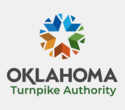Oklahoma Turnpike Authority
 Oklahoma Turnpike Authority logo | |
| Agency overview | |
|---|---|
| Formed | 1947 |
| Headquarters | 3500 Martin Luther King Ave. Oklahoma City, Oklahoma |
| Motto | We connect Oklahoma |
| Employees | 681 (2010) |
| Annual budget | $223.8 million (2010) |
| Minister responsible | |
| Agency executive |
|
| Website | www |
The Oklahoma Turnpike Authority (formerly Oklahoma Transportation Authority) is a government agency of Oklahoma that deals with issues regarding the Oklahoma turnpike system. Under the supervision of the Oklahoma Secretary of Transportation, the Authority's mission statement is to "construct, operate, and maintain a safe and economical turnpike system for the convenience of customers". Along with the Oklahoma Department of Transportation, the Authority is the primary infrastructure construction and maintenance agency of the State.
The membership of the Authority consists of the Governor of Oklahoma, an ex officio member, and six members appointed by the Governor with consent of the Oklahoma Senate. There are six districts within the Turnpike System and one member is appointed from each district.
The Authority was established in 1947 during the term of Governor of Oklahoma Roy J. Turner.
Leadership
The Turnpike Authority is under the supervision of the Secretary of Transportation. Under Governor of Oklahoma Mary Fallin, Gary Ridley is serving as the Cabinet Secretary. Secretary Ridley also serves as the Director of the Authority.
The Board of Directors of the Turnpike Authority is responsible for governing the Authority. The Board is composed of the seven members, six of which are appointed by the Governor of Oklahoma, with the approval of the Oklahoma Senate, with the Governor serving ex officio as the seventh member. The Board is responsible for appointing the Director of the Authority, who serves as the Board's pleasure.
As of March 2015, the Board of Directors has the following members:[1]
- Governor Mary Fallin
- Albert C. Kelly, Jr. - Chairman
- David A. Burrage - Vice Chairman
- G. Carl Gibson - Secretary and Treasurer
- Kenneth Adams
- Kevin Hern
- Gene Love
Organization
Structure
- Cabinet Secretary
- Board of Directors
- Director
- Deputy Director
- General Administration Division - responsible for providing direction and general services to entire Authority
- Highway Patrol - Oklahoma Highway Patrol troopers on assignment from Oklahoma Department of Public Safety, responsible for providing law enforcement services on turnpike system
- Information Technology Division - responsible for overseeing all information technology used by Authority
- Toll Operations Division - responsible for the collection of tolls from turnpike users
- Engineering Division - responsible for providing engineering for projects of the Authority
- Comptroller Division - responsible for auditing operations of Authority
- Maintenance Division - responsible for maintenance and repair on turnpike system
- PIKEPASS Division - responsible for operating the PIKEPASS automated toll collection system
- Finance and Revenue Division - responsible for overseeing all Authority finances and budget
- General Administration Division - responsible for providing direction and general services to entire Authority
- Deputy Director
- Director
Personnel
The Turnpike Authority, as of August 2012, has 552 full-time employees.
| Program | Staffing |
|---|---|
| Administration | 81 |
| Toll Operations | 255 |
| Turnpike Maintenance | 163 |
| PIKEPASS Operations | 53 |
| Total | 552 |
Budget
The budget of the Turnpike Authority is derived almost exclusively from the tolls collected from the users of the turnpike system. For Calendar Year 2010, tolls were $223.8 million. The Authority uses those funds as follows:
| Program | Funding (in millions) |
|---|---|
| Operations and Maintenance | $73 |
| Capital Outlay Plan | $57.1 |
| Debt Payments | $93.7 |
| Total | $223.8 |
Controversy
In January 2005, the authority caused a minor stir when it sent a letter to 41,000 people with a number purported to be a customer service line but, according to Reuters, callers "found themselves calling a sex line where they could speak with 'exciting people', such as lonely housewives, students and fantasy girls for $US2.99 a minute." The article notes that spokeswoman for the authority, Brigette Berglan, stated that "We're not that exciting here at the authority. We prefer to think of ourselves as helpful.", and that the authorities sent a postcard to the users with a phone number correction.[2]
See also
References
- ^ "Board of Directors & Executive Staff". Retrieved March 10, 2015.
- ^ Crossed lines (January 13, 2005). The Sydney Morning Herald.
- About the Oklahoma Turnpike Authority, Oklahoma State Transport Authority online. Retrieved January 14, 2005.

